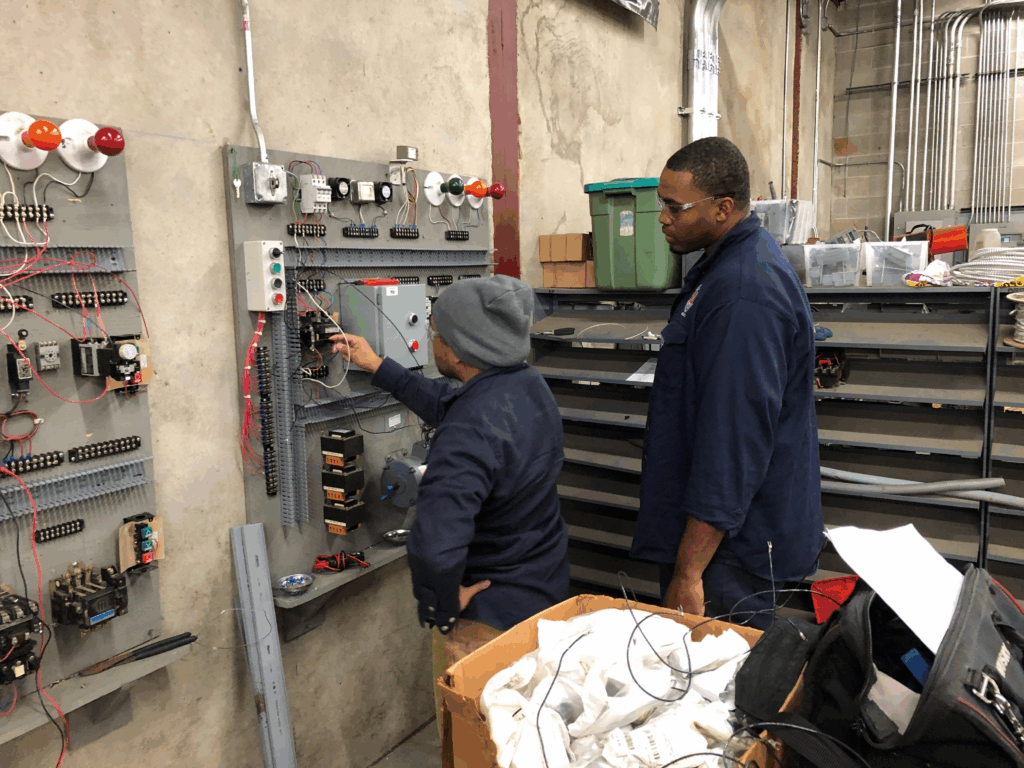Summary: The biggest difference between union and non-union electrical apprenticeships is that union programs offer consistent training, steady pay increases, good benefits, and strong job security through a nationwide network of contractors, while non-union programs can vary depending on the employer and may not always provide the same level of support.
If you’ve ever thought about becoming an electrical worker, you’ve probably heard about apprenticeships. They’re the best way to learn the trade while getting paid. But if you’ve started researching, you may have noticed something confusing: there are union apprenticeships and non-union apprenticeships.
At first glance, they might look the same: both offer hands-on training, both help you earn while you learn, and both can lead to a long-term career as a skilled electrical worker. But there are some important differences that can shape your experience, and your future.
Let’s take a closer look.
What Is a Union Apprenticeship?
A union apprenticeship is part of a registered training program backed by trade unions. Union electrical apprenticeships are jointly backed by the International Brotherhood of Electrical Workers (IBEW) and the National Electrical Contractors Association (NECA). Together, they’ve built training centers all over the country that set a consistent, high standard for electrical work.

When you join a union apprenticeship, you’re not just learning a trade, you’re joining a network. You’ll get classroom and lab instruction and on-the-job training under experienced, licensed journeyman electrical workers. You’ll also have access to a full support system: benefits, fair pay, safe working conditions, and guaranteed wage increases as you gain skills.
Because these programs are registered with the U.S. Department of Labor, you’ll earn nationally recognized credentials that can take you anywhere in the country. That means once you complete your training, you can work in any state that accepts your certification, without starting over.
What Is a Non-Union Apprenticeship?
A non-union electrical apprenticeship is typically sponsored by an individual contractor or an organization. Some of these programs are registered with the U.S. Department of Labor or a state agency, while others are not.
Non-union apprenticeships can be a good fit for people who want to start learning directly with a specific employer or prefer a more independent path. However, because each program is managed separately, pay scales, safety standards, and training quality can differ significantly. Some offer strong hands-on experience and knowledgeable mentors, while others may provide less structure or fewer benefits such as healthcare, retirement, or scheduled wage increases.
Comparing Union and Non-Union Electrician Apprenticeships
When you’re deciding between a union and non-union apprenticeship, it helps to look at five key areas: training, credentials, pay and benefits, work opportunities, and representation.
- Training
Union apprenticeships use a standardized, nationally recognized curriculum developed and updated by industry experts. That means every apprentice gets the same high-quality classroom instruction and hands-on experience, no matter where they train. Non-union apprenticeships can vary widely. Some provide solid instruction, but others depend heavily on the individual company or instructor. The consistency and depth of training simply aren’t guaranteed.
- Credentials
Union programs are registered with the U.S. Department of Labor, so the credentials you earn can be used nationwide. Once you complete your apprenticeship, you can take your certification anywhere in the country without starting over. Non-union apprenticeships may or may not be registered. If they’re not, the credentials you earn might only be recognized locally or by that specific employer.
- Pay and Benefits
In a union apprenticeship, pay increases are built into the program and guaranteed as you reach milestones in your training. You’ll also receive access to benefits like healthcare and retirement plans. Non-union apprenticeships don’t always offer these advantages. Wages, raises, and benefits are decided by the employer, so they can differ greatly from one company to another.
- Work Opportunities
Union apprentices are connected to a nationwide network of contractors and job opportunities, providing more options for steady, well-paying work during and after training. They also benefit from added job security. If a contractor runs out of work, the local training center helps place apprentices with another contractor so they can continue their training without interruption.
Non-union apprenticeships can offer good opportunities too, but they’re usually tied to one employer and are dependent on the stability of that employer. If that employer’s workload slows down or ends, the apprenticeship often ends as well, meaning you may need to find a new sponsor to keep training.
- Representation
One of the biggest differences is collective representation. Union apprentices are part of an organization that negotiates fair wages, benefits, and safety standards on their behalf. That support ensures consistency and fairness across the board. Non-union apprentices don’t have that kind of collective backing — their pay, benefits, and working conditions are set by the employer alone.
Why Choosing the Right Electrical Apprenticeship Program Matters
When you’re starting out, it’s easy to focus on the short term — getting a foot in the door, learning the basics, landing that first job. But the quality of your apprenticeship can shape your entire career. A registered, union apprenticeship is built for long-term success. It ensures you’re trained to the highest standards, protected on the job, and paid fairly for the skills you bring to the table.
Electrical work is essential, complex, and constantly evolving. That’s why top-tier training matters. A union apprenticeship gives you the tools and experience to grow not just into a journeyman electrical worker, but into a leader in your field.
How to Start a Union Electrical Apprenticeship Near You
If you’re ready to start your career as an electrician, a union electrical apprenticeship is the best way to do it, and getting started is simple.
Fill out our interest form, and from there you’ll be connected with your local Joint Apprenticeship and Training Committee (JATC) — the team that manages union electrician training in your area. They can walk you through the electrical apprenticeship application process, explain program requirements, and help you prepare for success.
Whether you’re just exploring options or ready to apply, filling out the form is the first step toward a rewarding, stable, and high-paying career in the electrical trades.
